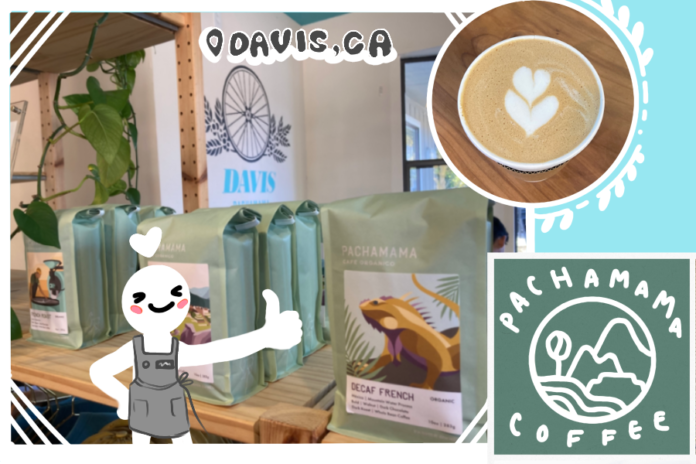The farmer-to-customer connection that brings high quality coffee to Davis residents
By MAYA KORNYEYEVA — mkornyeyeva@ucdavis.edu
Tucked away at the farthest end of downtown Davis, Pachamama is a quaint coffee house that serves only the highest quality, ethically sourced coffee. Seeing as I am already deep into my second year living in the city of Davis, I am astonished that it took me so long to visit such a unique location — Here’s how it happened.
This past weekend, I gave my friend a lift to the train station in the early hours of the morning. The air was chilly, and the rain and wind swept up the dried leaves and swirled them about. After saying goodbye, I decided to wander downtown, hoping to stop by one of my usual coffee locations — Mishka’s or Philz — for some caffeine and a bite to eat.
I barely stepped onto the G Street sidewalk when I saw Pachamama, a small cafe from which I could hear soft laughter and music. When I entered, I was greeted with the scent of espresso and the delicate blue hue of the ceiling. The faces of coffee farmers smiled down at me from one of the walls, and cups with latte art lined the countertop next to the bar.
After taking my first sip of the dulce de leche latte (a seasonal fall drink), I could immediately tell that the craft of the coffee was much higher than I was accustomed to; the espresso was creamy and blended beautifully with the milk, and the flavor was elevated by the subtle notes of caramel. I sipped the coffee as I walked through the drizzling rain back to my car and I couldn’t help feeling a sense of peace.
Upon arriving back at my apartment, I sat down to do a little research on Pachamama; I wanted to know what made their coffee so delicious and why I had never heard of the company before.
Turns out, the faces of the coffee farmers I saw on the wall of the cafe were actually the owners, and they lived all over the world — in Peru, Ethiopia, Mexico, Guatemala and Nicaragua. While most major CEO-run coffee companies like Starbucks and Peet’s Coffee simply buy coffee beans from farms in these regions, the farmers who operate Pachamama are part of a cooperative — meaning that they can help control their coffee prices and carefully manage the quality of the coffee they produce, acting as both buyers and sellers.
Being a part of a cooperative allows a coffee farmer to have better access to international markets, technology for farming/refining coffee beans and more agricultural and economic opportunities. This also fosters community and permits coffee farmers in the cooperative to work together to efficiently solve any problems that arise within the supply chain.
The international market for coffee is historically oversaturated with low quality beans that are sourced unethically from underpaid farmers. The coffee plantations themselves are also increasingly affected by rising temperatures and, due to climate change, are facing an uncertain future. A business like Pachamama brings shade-grown organic coffee straight from the farmer to the customer, meaning that the coffee is actually priced for what it is worth and puts money directly into the pockets of the farmers.
While it is true that the beverages at Pachamama are priced slightly above other coffee shops in Davis, they are, in my opinion, truly worth the spend. The virtuosity of the company’s mission, the obvious care with which they handle their product and the quick and quality service all work to create a model for what I believe all coffee companies should strive to be: a business that prioritizes ethical sourcing and worker compensation at every step along the way.
I am incredibly grateful to have stumbled upon Pachamama (better late than never, I always say). That day I received not only a stellar cup of coffee, but also a story — a tale of how coffee is not just a product to be sold on the shelf but the livelihood of thousands of people. While the Davis Pachamama may be located on the very outskirts of downtown, it is absolutely a destination to be discovered and enjoyed.
Written by: Maya Kornyeyeva — mkornyeyeva@ucdavis.edu
Disclaimer: The views and opinions expressed by individual columnists belong to the columnists alone and do not necessarily indicate the views and opinions held by The California Aggie.









